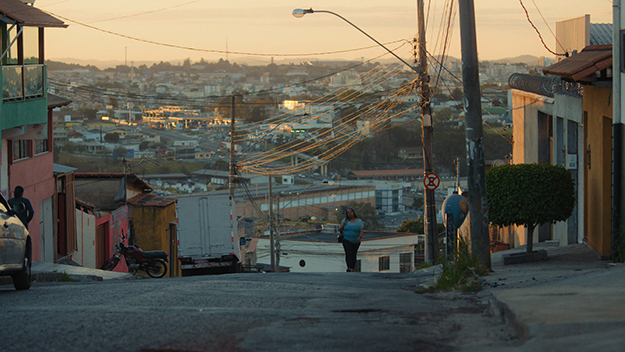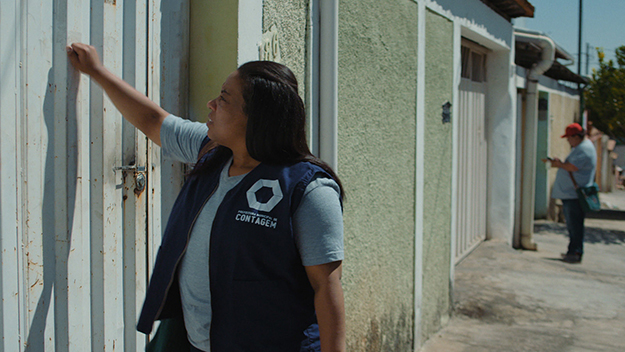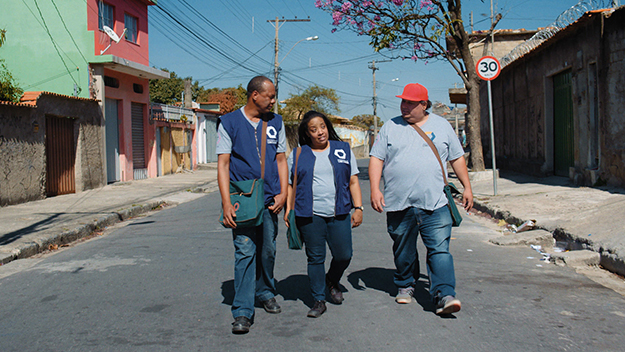Interview: André Novais Oliveira & Grace Passô

In André Novais Oliveira’s Long Way Home, screening March 31 and April 2 as part of New Directors/New Films, a group of dengue inspectors fans out through the neighborhood of Contagem on the outskirts of Brazil’s Minas Gerais state capital, Belo Horizonte. The new member of this group, Juliana (Grace Passô), has just moved from another peripheral city and must adapt to her new surroundings, which she does quickly, as if by camouflage, revealing little of herself. During inspections, Juliana goes into the homes of other lonely women, some solicitous, others confrontational, and faces daily challenges, such as scorpions and climbing ladders. All the same, Juliana possesses remarkable resilience. Thanks to her colleagues’ compassion and to their openness about their own anxieties, she eventually opens up and rediscovers her inner strength.
Long Way Home is that rare collaboration between director and actor—in fact, an entire ensemble of local professional and non-professional actors—in which the mostly black performers’ presence, and their personal trajectories and deep affinity with the locations, language, music, décor, and manners of the periphery, are as important as the director’s vision. In this sense, Novais Oliveira, along with the production company, Filmes de Plástico (literally, Films of Plastic, or Plastic Films), which he co-founded in 2009, is a pioneer on the Brazilian movie scene. His cinematic language boldly affirms black Brazilian experience as fundamental to the national cinema and arts. Like the work of Adirley Quierós and early black Brazilian film pioneer Zózimo Bulbul, Novais Oliveira’s film draws our attention to these marginal communities as sources of the richness of Brazilian culture. The sense of local language—rhythms, slang, and sly, loquacious humor—is one crucial aspect of this project. Equally important is the film’s validation of the quotidian, of the fleeting and the microscopic.
In the run up to the screening of Long Way Home at New Directors/New Films, I spoke via Skype with actor Grace Passô and director André Oliveira Novais about their collaboration, and about Brazilian independent and black cinema.
André, how did you come to cast Grace as Juliana?
André Oliveira Novais: I had seen Grace’s work in the theater, but when I worked as assistant director on In the Heart of the World, by Gabriel and Maurílio Martins, I got to see her rehearse. I had been working on the screenplay for Long Way Home, and since that moment I began to think of her as my main protagonist, without yet knowing if she’d accept.
Grace, what made you then accept the role?
Grace Passô: So many things. First, I’m very taken by the poetics of André’s cinema, the way he structures his films, how he tells his stories, and especially the way he sees his characters. And I grew up in Belo Horizonte, in a neighborhood that’s very similar to where Long Way Home takes place—the architecture, the way of relating to and interacting with your neighbors, the workers, the sounds of that landscape, all this really reminds me of the place where we filmed.
Juliana is so different from the other characters I’ve seen you portray. Her body language is quieter. Can you tell me about your approach to this role?
GP: I created Juliana as a person who listens. She is an attentive observer of people and of daily life, and by observing she expands her own perspective on who she is. She has very little dialogue, considering everything that happens to her, except for that one crucial scene at the waterfall, when she says that she had stayed mute as a child, until one day she screamed. Observing is her way of being, it’s how she arrives at her own freedom. The stories in the film all revolve around Juliana, and yet, she doesn’t always appear to be in the foreground. That’s what interested me.

André, you’ve mentioned in interviews that Long Way Home is partly a depiction of the crisis of masculinity, especially the male character who learns that he is a father through a paternity test. I wondered if you also thought of the crisis of femininity, since Juliana must reconstruct her life in an environment in which women are often defined by babies and family?
ANO: I didn’t think of a crisis of femininity, per se, but I did think of a woman who goes through a crisis with power and dignity. The entire film, and not just Juliana’s story, is essentially about change. From Juliana’s first appearance until the very last scene, when she is driving a car, we see a period of her life during which the before and after are two entirely different existences. In the film, Juliana undergoes change gradually: Her relationship, apartment, work, friendships, her coming to slowly understand her past and her relationship with her father, her mother’s death, her personal tragedy. She starts to develop a sense of humor, and to have a real connection with those around her. She is more at ease. She changes her hair. The camera and editing revolve around following these changes closely.
I love that Cassavetes’s Minnie and Moskowitz served as a reference. Was there a particular scene from that film that inspired you?
ANO: The scene when Gena Rowlands goes to the movies and then to an older woman’s house, and they drink wine and talk. The two women’s sudden closeness really touched me. They sit in the dark and have a very intimate chat. They also raise the question of having sex when you are middle-aged or older. I thought all this was a good reference for the intimate scene when Grace speaks with her cousin, and they are sitting in the kitchen, it’s very quiet, and they are drinking cachaça.
You’ve also been inspired by Kelly Reichardt’s Certain Women.
ANO: Yes, by the way her camera works. It’s a question of rhythm. I have a feeling—and I spoke about this with Gabriel Martins many times, because he’s the one who recommended I watch the film, which I did three times—a feeling that Reichardt has complete control over how she shows the place. She knows it very well, and is sincere in her approach to it and to the women. She creates an atmosphere so well.
Speaking of complete control, it’s how I felt about your film’s portrayal of the dengue inspectors. I assume you had some direct experience in this area?
ANO: I worked for a dengue prevention agency. I saw that it was a different way of getting to know the neighborhood, because you are always out, walking through it.
And all those details—the scorpion, the infested pool—
ANO: It’s all very specific to the job.
Filmes de Plástico is now associated with naturalist cinema, but this definition seems limiting given that your films and those of the other founders, Gabriel Martins and Maurílio Martins, are so different.
ANO: We don’t limit ourselves to a single concept. Even though we have things in common, we don’t want to end up being put in a box. What we share is perhaps a certain respect for the places and people we film.
Hence the epic, heroic aspect of these two films—even though it’s not always taken entirely seriously. You both have a humorous touch.
ANO: I think our characters invite the audience to treat the neighborhood and the people living there without fear, giving the place its proper credit, because, after all, it is incredible. And it brims with life.
Grace mentioned what a unique place Filmes de Plástico occupies in Brazil. Can you describe how you came to making movies, and then co-funding the company with Gabriel Martins, Maurílio Martins, and Thiago Macêdo Correia?
ANO: I watched a lot of movies in my childhood. I was influenced by my older brother, Renato, who now acts in my films. We used to rent a lot of movies from local video stores. At 15, I started going to festivals in Belo Horizonte. I absolutely fell in love with cinema. We have a very important festival of shorts, Curtas BH, and also Mostra Indie that takes place in Belo Horizonte and in São Paulo. These two festivals are always well attended, and back then even more so. I then took a one-year technical course at Escola Livre de Cinema (Oficina de Cinema back then), during which I went from the basics to making my first short films. I met a lot of people there that I know to this day: Gabriel Martins and Thiago Macêdo Correia who are partners at Filmes de Plástico studied there. Those were our beginnings.

Grace, what were your beginnings like as a black Brazilian actress and dramaturg, and how do you see the challenges you faced then and now?
GP: I still see a lack of access and opportunity for artistic development of black performers in Brazil today. Of course, it has changed a lot and continues to change, but there is an enormous gap. Our national cinema continues to invest in narratives that draw little attention to race or, to be more precise, that don’t acknowledge black lives. It should be said, however, that in Brazil, black militancy has a very long history. It has been raising urgent questions for many years. So yes, our visibility has increased as a result. Today we can speak of black Brazilian cinema with more frequency, and can discuss the fact that black actors’ work, black filmmakers’ films, are being distributed. This is all the fruit of the tremendous black artistic militancy.
In my case, I began writing plays after studying theater in Belo Horizonte, because I wanted to create a symbolic space in which the people like me, people I knew, could exist, where my universe could be conceptualized. I felt an intellectual affinity, but also a great distance to what I had been studying, knowing that the symbols, the places and people were missing from the dramatic texts that I was reading. I began to understand that I needed to create the work to be reflected in it.
André, how about your experiences as a young black filmmaker?
ANO: When I first started out, I very much felt like fish out of the water, and not just at film school but also at festivals. Gabriel Martins and I have often talked about it. It’s something that’s changing literally now—the change is very recent. And it’s not just about black filmmakers, but also about directors outside big cities. It was rare before to see someone from the outskirts at film festivals.
Is it primarily a question of access?
ANO: I think it’s more than that. Access, for sure, but first and foremost, it’s about racism. Basically you are being told all the time that you don’t belong.
At Filmes de Plástico, we always talked about the fact that we were made to feel we didn’t belong, and so we had to occupy that space, no matter what. This way the face of Brazilian cinema could change. It’s a slow process, but it is taking place. In our case, just the fact of having three black filmmakers from the outskirts as founding partners, and all of them wanting to make films set in and about the outskirts—none of this was typical at the time. It was our way of staking out our place.
Ela Bittencourt works as a critic and curator in the U.S. and Brazil and consults for a number of international film festivals. She also runs the film site, Lyssaria.







